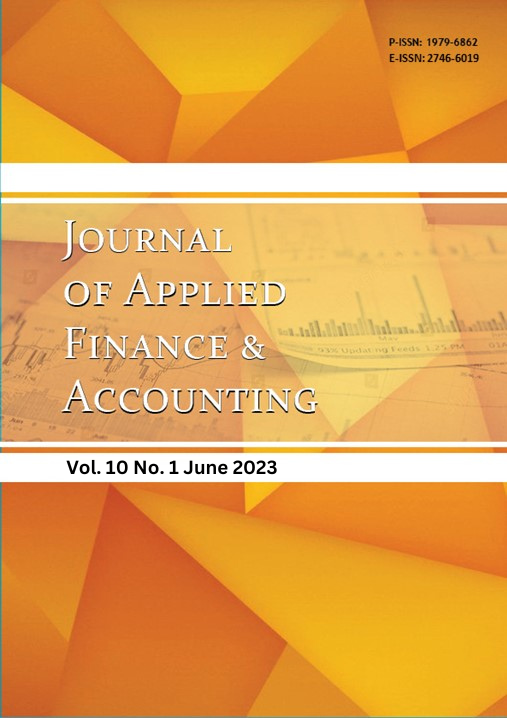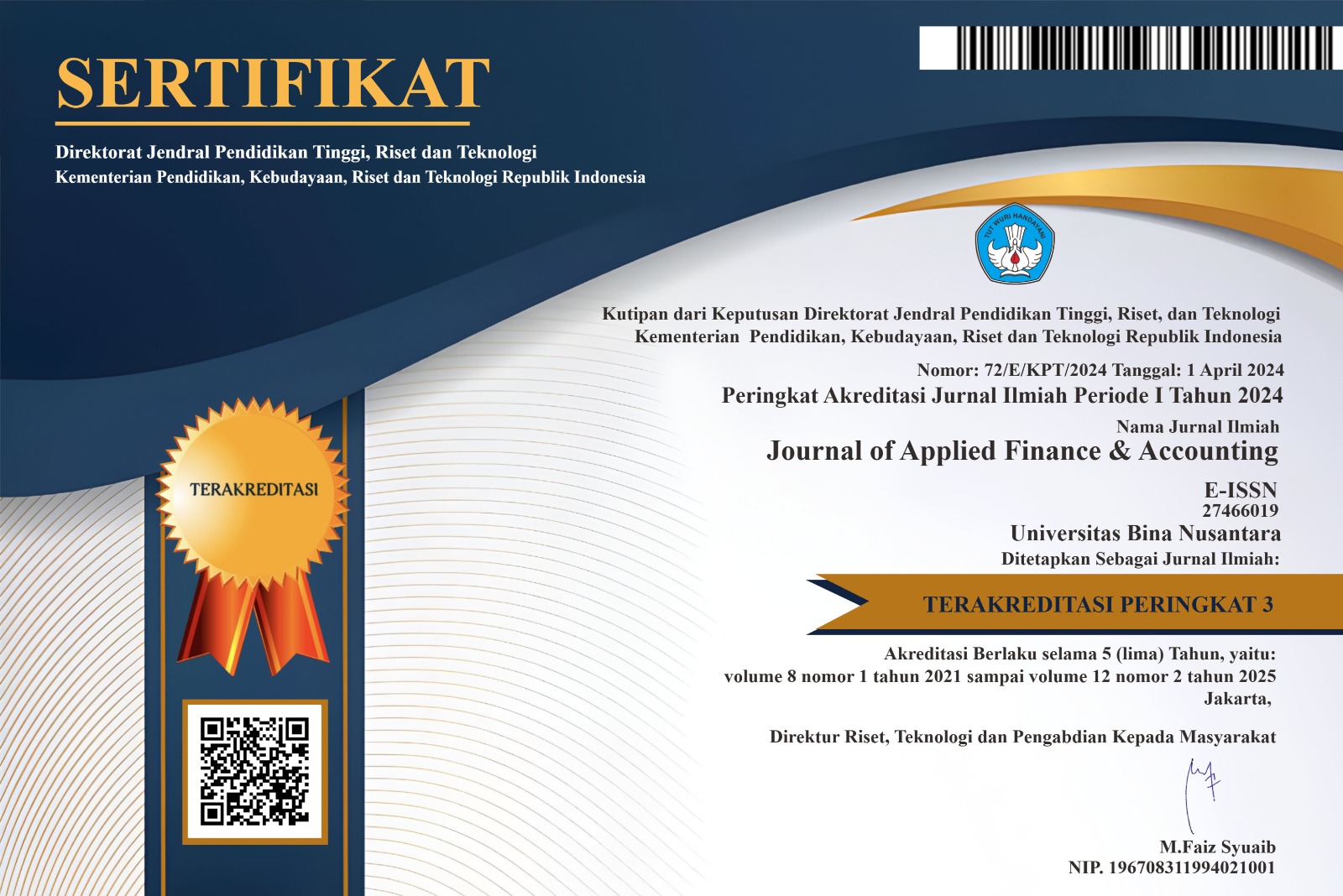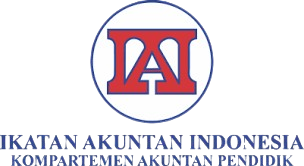THE IMPACT OF RELIGIOSITY ON PERCEPTIONS OF THE ROLE OF INDEPENDENT COMMISSIONERS IN THE IMPLEMENTATION OF CORPORATE GOVERNANCE IN SHARIA FINANCIAL ENTITIES IN INDONESIA
DOI:
https://doi.org/10.21512/jafa.v10i1.9713Keywords:
Religiosity, Governance, Understanding, Accounting, ShariaAbstract
The aim of this research is to analyze whether there is an impact of religiosity as well as understanding of Islamic accounting and finance concepts on perceptions of the role of independent commissioners in relation to corporate governance in Islamic financial entities in Indonesia. The research uses primary data by distributing questionnaires to employees in Islamic financial institutions. The results showed that religiosity had a positive and significant effect on perceptions of the role of independent commissioners in corporate governance in Islamic financial institutions, while an understanding of Islamic accounting and finance did not show a significant effect. Research has not been able to prove whether the quality of financial reports can moderate the level of understanding of Islamic accounting and finance because the data obtained from the questionnaire comes from a limited number of Islamic financial institutions.
References
Adnan,M.A & M Gaffikin, 1997,” The Shariah, Islamic Banks and Accounting Concept and Practices, paper presented at Accounting, Commerce and Finance; The Islamic Perspective International Conference, University Of Western Sydney, 1997
Archer, Simon,Rifaat Abdel Karim & Talla El Dehani 1998 ,” Financial Contracting, Governance Structure and The Accounting Regulation Of Islamic Banks: An Analysis In Terms Of Agency Theory and Transaction Cost
Asih, Daru, 2015,“ Dimensi-Dimensi Spiritualitas dan Religiusitas Dalam Keperilakuan Konsumen”, Tinjauan Literatur, Program Doktor Managemen FEB Universitas Gajah Mada
Augustine, Yvonne & Robert Kristaung, 2013,” Metodologi Penelitian Bisnis Dan Akuntansi “ Penerbit Dian Rakyat, Jakarta
Chapra, M.U & Ahmed, H, 2002 ,” Corporate Governance in Islamic Financial Institutions”, Research and Training Institute Islamic Development Bank, Jeddah
Ecip, S Sinansari et al, 2002,” Ketika Bagi hasil Tiba;Perjalanan 10 Tahun Bank Muamalat,PT Bank Muamalat
Ghozali, Imam & Hengky Latan,2015,”Partial Least Square,Konsep, Teknik dan Aplikasi Menggunakan Program SmartPLS Untuk Penelitian Empiris, Badan Penerbit Universitas Diponegoro
Jensen, M, & Meckeling,W 1976,” Theory Of The firm: Managerial behaviour, agency cost and ownership structure”, Journal Of Financial Economics, Vol 3,pp 305-60
Kamayanti, Ari, 2016 “ Metodologi Konstruktif Riset Akuntansi Membumikan Religiositas, Yayasan Rumah Peneleh
Khan, Tariqullah, 2008, “ Corporate Governance In Islamic Bank “, GDLN IRTI Distance Learning
Kanagaretnam Kiridaran, Gerald J Lobo dan Chong Yang, 2013,”Religiosity & Earnings Managenent, International Evidence From The Banking Industry”
Lewis, Mervyn K, 2005, “ Islamic Corporate Governance,” Review Of Islamic Economics, Vol 9 No 1, 2005
Menouar, El Yasemin, 2014, “ ”, Berstellman Stiftung
Murwaningsari, Etty, 2010,” The Relationship Of Corporate Governance, Corporate Social Responsibilities,Indonesian Management and Accounting Research Vol 9 No 1
Murwaningsari, Etty & Sistya Rachmawati, 2017,” The Influence Of Capital Intensity and Investment Opportunity Set Toward Conservatism With Managerial Ownership and Moderating Variable
Pearce, JA II & Zahra, SA (1992),” Board Composition from a strategic contingency perspective”, Journal Of Management Studies, Vol 29 No 4,pp 411-38
Pamungkas, Imam Dapit, 2014,”Pengaruh Religiusitas & Rasionalisasi Dalam Mencegah & Mendeteksi Kecenderungan Kecurangan Akuntansi”,Jurnal Ekonomi dan Bisnis Volume 15
Rahman, Abdul Rahim Abdul” Contribution Of The Islamic Principle Of Maaliah”, IIUM Journal Of Economics and Management
Rustiana, Siti Hamidah, 2016,The Development Of Syariah Accounting In Indonesia, International Journal Of Business, Economics and Law, Vol 9, Issue 5.
Sakti, Muhammad Rizki Prima & Azhar Mohamad,2018,” Efficiency, Stability and Asset Quality of Islamic Vis a Vis Conventional Banks”, Journal Of Islamic Accounting and Business Research, Vol 9 No 3
Sari,Synthia, Engkos Kuncoro & Haryadi Sarjono,2014,” ICMLG 2014 Proceeding of the 2nd International Conference Of Management
Sekaran, Uma, 2013 “ Research Methods For Business-A Skill Building Approach, Wiley, USA
Tapanjeh, Abdussalam Mahmud Abu, 2009 “ Corporate Governance From The Islamic Perspective, A Comparative Analysis With OECD Principles”,Critical Perspective On Accounting
Tomar, Shouruq & Adel Bino, 2012,” Corporate Governance and Bank Performance: Evidence From Jordan Banking Industry”, Jordan Journal Of Business Administration, Vol 8 No 2
Zubairu, Umaru Mustapha & Olalekan Busra Sakariyau, 2016 : The Relationship Between Religiosity & Academic Performance Amongst Accounting Students”, International Journal Of Evaluation & Research In Education,Vol 5, N0 2, June 2016
Downloads
Published
Issue
Section
License
Authors who publish with this journal agree to the following terms:
Authors retain copyright and grant the journal right of first publication with the work simultaneously licensed under a Creative Commons Attribution License that allows others to share the work with an acknowledgement of the work's authorship and initial publication in this journal.
Authors are able to enter into separate, additional contractual arrangements for the non-exclusive distribution of the journal's published version of the work (e.g., post it to an institutional repository or publish it in a book), with an acknowledgement of its initial publication in this journal.
Authors are permitted and encouraged to post their work online (e.g., in institutional repositories or on their website) prior to and during the submission process, as it can lead to productive exchanges, as well as earlier and greater citation of published work (See The Effect of Open Access).





